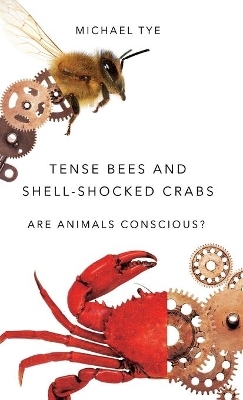
Tense Bees and Shell-Shocked Crabs
Oxford University Press Inc (Verlag)
978-0-19-027801-4 (ISBN)
In the seventeenth century, the famous French philosopher, Rene Descartes, held that nonhuman animals, lacking souls, are organic automata without any consciousness. This led him to participate in vivisections on dogs, dismissing their howls as mere noises. Voltaire later ridiculed Descartes' view; and it is certainly a position to which hardly anyone would subscribe today. But just which animals are conscious? Most people would admit mammals generally; but what about fish? Honeybees? Crabs? Turning to the artificial realm, what about suitably complex robots?
These questions are hard to answer in part because feelings and experiences are subjective things, and we have no direct access to the feelings and experiences of others. Exacerbating the issue is the fact that there are differences between human brains and the brains of nonhuman creatures. With the differences in neurophysiology, perhaps the crucial feature underwriting any spark of consciousness is missing with the result that the animals simply function in ways that are similar to us along various dimensions without feeling as we do on the inside or feeling anything at all for that matter. In some cases, the differences in neurophysiology seem acute. Take fish, for example, or insects. Fish lack a neocortex, as do insects, and, in humans, consciousness is often held to require cortical activity.
The present book suggests a methodology for dealing with these questions, without endorsing any specific theory of the nature of consciousness (about which there is little agreement anyway), and offers concrete answers. In the final chapter, there is a discussion of the ethical treatment of animals and related issues, including whether we should be vegetarians.
Michael Tye encountered philosophy at Oxford and taught at Temple University, St. Andrews, and the University of London before coming to the University of Texas at Austin in 2003, where he is the Dallas TACA Centennial Professor in Liberal Arts.
Chapter 1: Experience and Its Limits: The Problem.
Chapter 2 -- Experience and Consciousness
2.1 Problem Cases?
2.2 The Higher Order Theory of Consciousness
2.3 Phenomenal consciousness versus access consciousness
2.4 Phenomenal consciousness versus access consciousness
2.5 The upshot for animal consciousness
Chapter 3: It's Got to be Human!
3.1 Descartes and the animals
3.2 Descartes and Turing
3.3 Conceptualism about experience
Chapter 4 - Our Friends and Neighbors
4.1 Beliefs and desires
4.2 Experiences and feelings
Chapter 5: Reasoning about Other Species
5.1 Cupcake's pain
5.2 Sharpening the issue
5.3 Is the absence of a neocortex a defeater?
5.4 Should we be agnostic?
5.5 Alternative strategies
Chapter 6: A Fish Called Wanda
6.1 Pain
6.2 Fish nociception and fish behavior
6.3 Is there a better explanation?
6.4 Fish fear
6.5 Perceptual consciousness in fish
6.6 Yes, but are there really fish qualia?
Chapter 7: Of Birds and Reptiles (and Fish)
7.1 The origins of birds
7.2 Bird emotions
7.3 Birds and pain
7.4 Perceptual experiences in birds
7.5 Reptiles
Chapter 8: Tense Bees and Shell-Shocked Crabs
8.1 Insect nociception and pain
8.2 Insects and emotions
8.3 Are bees zombies?
8.4 Crabs and pain
8.5 Crabs and bees
Chapter 9: The Girl Who Cannot Feel Pain
9.1 A complaint from Block
9.2 Protozoa
9.3 Plants
9.4 Caterpillars
Chapter 10: Commander Data and Robot Rabbit
10.1 The original China-Body problem
10.2 Reasoning about Commander Data
10.3 The silicon chip argument
10.4 Real rabbit and robot rabbit
10.5 A further reason for preferring the view that Commander Data and robot rabbit are conscious
10.6 A final consideration
Chapter 11: The Ethical Treatment of Animals
11.1 Animal welfarism
11.2 Speciesism
11.3 Regan and Rawls
11.4 Centered speciesism and biological proximity
11.5 The treatment of animals
| Erscheinungsdatum | 30.11.2016 |
|---|---|
| Verlagsort | New York |
| Sprache | englisch |
| Maße | 211 x 147 mm |
| Gewicht | 386 g |
| Themenwelt | Geisteswissenschaften ► Philosophie ► Erkenntnistheorie / Wissenschaftstheorie |
| Geisteswissenschaften ► Philosophie ► Ethik | |
| Geisteswissenschaften ► Psychologie ► Verhaltenstherapie | |
| Naturwissenschaften ► Biologie ► Humanbiologie | |
| Naturwissenschaften ► Biologie ► Zoologie | |
| ISBN-10 | 0-19-027801-3 / 0190278013 |
| ISBN-13 | 978-0-19-027801-4 / 9780190278014 |
| Zustand | Neuware |
| Haben Sie eine Frage zum Produkt? |
aus dem Bereich

![Was heißt Denken?. Vorlesung Wintersemester 1951/52. [Was bedeutet das alles?] - Martin Heidegger](/media/113619842)
